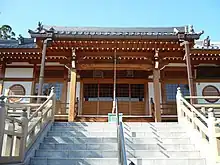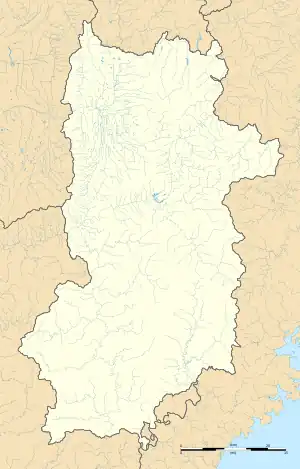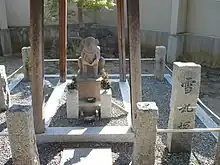Daruma-ji
Daruma-ji (Japanese: 達磨寺, lit. 'Daruma Temple', also called Daruma-dera) is a Zen Buddhist temple in the city of Ōji in the Kitakatsuragi District, Nara Prefecture, Japan and is one of the 28 historical Sites of Prince Shōtoku.
| Daruma-ji | |
|---|---|
達磨寺, だるまじ | |
 Daruma-ji's main hall | |
| Religion | |
| Affiliation | Buddhist |
| Prefecture | Nara |
| Location | |
| Municipality | Kitakatsuragi |
| Country | Japan |
 Shown within Nara Prefecture  Daruma-ji (Japan) | |
| Prefecture | Nara |
| Geographic coordinates | 34°35′24″N 135°42′24″E |
History
The founding of the temple is associated with an event recorded in the 8th century work Nihon Shoki.[1] In Book XXII, Prince Shōtoku met a man in December 613. The man was starving, and Prince Shōtoku tried to feed him and give him aid, but the man died of hunger and Prince Shōtoku had a kofun built for him.[2] Days later, Prince Shōtoku declared that the man was a sage and had a messenger inspect the tomb, which was undisturbed but empty when opened.[3] In Nihon Shoki the sage is unnamed, but was later attributed as Daruma (Japanese: 達磨, lit. 'Bodhidharma').[4][5]
The Daruma-ji temple was built at the kofun in the early 13th century during the Kamakura period.[6][7] The temple was razed in the early 14th century by Buddhists who opposed the spread of the Zen school in Japan.[8] It was rebuilt in 1430 under the direction of Ashikaga Yoshinori.[9] The temple was burned down by Matsunaga Hisahide in the 16th century during the Sengoku period, and subsequently rebuilt by the order of Emperor Ōgimachi.[10]
Cultural artifacts

Daruma-ji has a statue memorializing Prince Shōtoku's dog Yukimaru,[11][12] who was said to be able to understand speech and could read Buddhist writings.[13] Yukimaru's association with Daruma-ji inspired the city of Ōji to use Yukimaru as the Yuru-chara (mascot) for the city beginning in 2013.[14][13]
Daruma-ji has several artifacts that are designated as cultural properties. The hōjō was constructed in 1667 and became a prefecture-designated tangible cultural property in 1989.[15]
The Daruma-ji Chukoki Sekido (Japanese: 達磨寺中興記石幢, lit. 'Stone Column Recording the Revival of Daruma-ji') is a stone monument erected in 1448, describing the restoration of the temple during the Muromachi period, which was supported by the Muromachi bakufu.[6] The stone became a nationally designated important cultural property in 1923. In 2000, a stone was found in the base of the Chukoki stone which was inscribed in 1442, along with a Bizen ware pot and an incense burner that were subsequently assigned as nationally designated cultural properties.[16]
The temple has a wooden seated statue of Daruma, made in 1430 and commissioned by Ashikaga Yoshinori, that was designated as an important cultural property in 1909.[17] The temple also has a wooden seated statue of Prince Shōtoku that was designated as an important cultural property in 1923.[18] A pair of paintings at the temple, one of Prince Shōtoku and one of Daruma, are designated as important cultural property[19] along with a silk painting of the Buddha's death. The silk painting was originally held by the temple[20] and is now held at the Nara National Museum.[21] A wooden seated statue of Senju Kannon created during the Muromachi period was designated a tangible cultural property in 2005.[22]
References
- Winkel, Margarita (2012). "Entertainment and Education". In Beerens, Anna; Teeuwen, Mark (eds.). Uncharted Waters: Intellectual Life in the Edo Period. Leiden: Brill. pp. 19–21. ISBN 978-90-04-22901-3. Archived from the original on January 11, 2023. Retrieved January 11, 2023.
- "Darumaji: A stone stupa deposited upright, a new facet of Medieval Buddhist relic belief". archaeology.jp. Archived from the original on September 23, 2021. Retrieved October 25, 2022.
- Aston, W.G. (1896). Nihongi: Chronicles of Japan from the Earliest Times to A.D. 697. London: The Japan Society. pp. 144–145. ISBN 9780524053478. Archived from the original on January 11, 2023. Retrieved October 28, 2022.
- Borgen, Robett (March 2006). "A Record of Seven Generations: Fragments of Bodhidharma, Huisi, Prince Shōtoku, and Jōjin" (PDF). Nihon Kanbun Kenkyū 日本漢文学研究: 8. Archived (PDF) from the original on October 28, 2022. Retrieved October 28, 2022.
- Faure, Bernard (2011). "From Bodhidharma to Daruma: The Hidden Life of a Zen Patriarch". Japan Review. 23 (23): 48. JSTOR 41304923.
- "達磨寺" [Daruma-ji Temple]. Naru Women's University (in Japanese). Archived from the original on August 17, 2022. Retrieved October 24, 2022.
- "片岡山 達磨寺" [Kataokayama Darima-ji Temple]. Darumaji.jp (in Japanese). Archived from the original on October 28, 2022. Retrieved October 24, 2022.
- Jorgensen, John (2013). "The Zen Commentary on the Lankavatara Sutra by Kokan Shiren (1278–1346) and its chief antecedent, the commentary by the Khotanese monk Zhiyan" (PDF). Annual Report of the Institute for Zen Studies. 32: 32. Archived (PDF) from the original on November 4, 2022. Retrieved January 11, 2023.
- The Japan Weekly Mail: A Review of Japanese Commerce, Politics, Literature, and Art. 1890. p. 405. Archived from the original on January 11, 2023. Retrieved October 28, 2022.
Darumaji, at Oaza Oji, Oji-mura, Kazashimu-gan, built by Ashikaga Yoshinori in the 2nd year of Eikyo, to replace the temple erected on the same site some centuries before by Shotoka Taishi, is 461 years old.
- "達磨寺の見どころとぎもん" [Highlights of Daruma-ji]. darumaji.jp (in Japanese). Archived from the original on October 28, 2022. Retrieved October 26, 2022.
- Ainley, Nathaniel (February 25, 2017). "A Tiny Japanese Town Built a Very Good Doggy Drone". Vice. Archived from the original on October 28, 2022. Retrieved October 27, 2022.
- Jordan, Alec (February 27, 2017). "Will This Flying Puppy Drone Bring the Tourists to Oji in Droves?". Tokyo Weekender. Archived from the original on October 28, 2022. Retrieved October 27, 2022.
- Fukunaga, Masaki (March 1, 2018). "Nara mascot seeks breakthrough in Year of the Dog". Honolulu Star-Advertiser. Archived from the original on October 28, 2022. Retrieved October 25, 2022.
- Le Blanc, Steven; M, Masami (February 21, 2017). "Oji Town unleashes ultimate PR tool: a flying puppy!". Sora News 24. Archived from the original on October 28, 2022. Retrieved October 25, 2022.
- "達磨寺方丈" [Hojo of Daruma-ji]. pref.nara.jp (in Japanese). June 30, 2016. Archived from the original on October 28, 2022. Retrieved October 27, 2022.
- "達磨寺中興記石幢" [Stone Column Recording the Revival of Daruma-ji]. pref.nara.jp (in Japanese). June 30, 2016. Archived from the original on January 29, 2022. Retrieved October 24, 2022.
- "木造達磨坐像(所在:達磨寺)" [Wooden seated Daruma statue (Location:Daruma-ji)]. pref.nara.jp (in Japanese). July 13, 2016. Archived from the original on December 4, 2021. Retrieved October 24, 2022.
- "木造聖徳太子坐像(所在:達磨寺)" [Wooden seated statue of Prince Shōtoku (Location:Daruma-ji)]. pref.nara.jp (in Japanese). July 13, 2016. Archived from the original on October 28, 2022. Retrieved October 24, 2022.
- "聖徳太子画像及び達磨大師画像(所在:達磨寺)" [Images of Prince Shōtoku and Daruma Daishi (Location:Daruma-ji)]. pref.nara.jp (in Japanese). July 13, 2016. Archived from the original on October 28, 2022. Retrieved October 24, 2022.
- Monbushō, Shūkyōkyoku (1920). Handbook of the Old Shrines and Temples and Their Treasures in Japan. Tokyo: Bureau of Religions, Department of Education. pp. 3–4. Archived from the original on January 11, 2023. Retrieved October 28, 2022.
- "絹本著色涅槃図" [Painting of Nirvana on Silk]. pref.nara.jp (in Japanese). August 1, 2018. Archived from the original on October 28, 2022. Retrieved October 24, 2022.
- "木造千手観音坐像(所在:達磨寺)" [Wooden seated Senju Kannon (Location:Daruma-ji)]. pref.nara.jp (in Japanese). June 30, 2016. Archived from the original on April 15, 2022. Retrieved October 24, 2022.
External links
- Official website (Japanese)